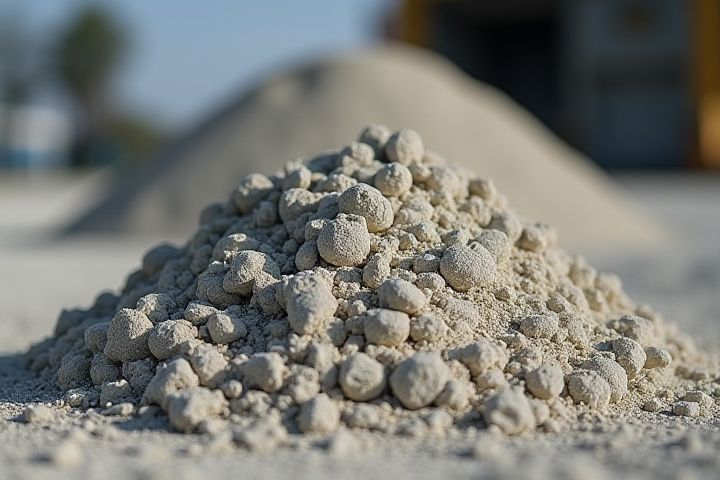
Cement production in Nigeria has seen substantial growth, driven by the country's booming construction sector and increased infrastructure development. Leading manufacturers, such as Dangote Cement and Lafarge Africa, dominate the market, contributing significantly to both local and national economies. The Nigerian government has implemented policies to encourage domestic production, reducing reliance on imported cement and thus bolstering local job creation. With a current production capacity exceeding 50 million metric tons annually, the sector aims to utilize alternative raw materials and energy sources to enhance sustainability. As your understanding of the market grows, exploring the opportunities within this evolving industry can provide valuable insights and potential investment avenues.
Major producers like Dangote Cement and Lafarge Africa
Cement production in Nigeria is dominated by major players, with Dangote Cement leading the market as the largest producer in the country. Lafarge Africa also holds a significant share, contributing to the industry's growth and development. These companies have invested heavily in production facilities and infrastructure, enhancing the local supply chain and reducing reliance on imported cement. The focus on sustainable practices and local sourcing is fostering economic growth and creating job opportunities within the Nigerian construction sector.
Dominant presence of limestone reserves
Cement production in Nigeria primarily hinges on the abundant limestone reserves found throughout the country, making it a crucial component of the construction industry. These limestone deposits, particularly located in regions such as the South-West and North-Central, provide essential raw materials for the manufacturing of cement. The rich mineral composition supports not only domestic demand but also positions Nigeria as a competitive player in the West African cement market. As you consider investment opportunities in the construction sector, understanding the significance of these limestone reserves can offer valuable insights into the potential for growth and sustainability in cement production.
Increased local production capacity
Cement production in Nigeria emphasizes enhancing local manufacturing capacity to meet the domestic demand for construction materials. Major players in the industry, such as Dangote Cement and Lafarge Africa, have invested significantly in expanding their production facilities, contributing to job creation and economic growth. With a strategic focus on utilizing locally sourced raw materials, these companies aim to reduce dependency on imports and lower costs for consumers. You can benefit from the resulting competitive market, which promises more affordable prices and improved product quality.
Government policies promoting local manufacturing
Cement production in Nigeria is significantly shaped by government policies that prioritize local manufacturing to boost the economy and reduce reliance on imports. Initiatives such as import tariffs and tax incentives have encouraged domestic companies to increase their output, fostering a competitive market environment. The Nigerian government's commitment to infrastructure development further enhances demand for locally produced cement, supporting ongoing construction projects across the country. You can explore various local cement brands that have emerged as key players, driving innovation and sustainability within the industry.
Import restrictions boosting local industries
Cement production in Nigeria has significantly increased due to import restrictions, which aim to bolster domestic manufacturing capabilities. These policies have encouraged local producers to enhance their production capacities and improve the quality of cement, catering to both construction and infrastructure development needs. As a result, Nigeria has witnessed a rise in job creation within the cement industry, positively impacting the economy. Your investment in local cement brands not only supports these initiatives but also contributes to the overall growth of Nigeria's industrial landscape.
Growing domestic demand due to urbanization
Cement production in Nigeria is significantly driven by increasing domestic demand, largely propelled by rapid urbanization. As more people migrate to urban areas, the need for infrastructure, housing, and commercial buildings intensifies, placing pressure on local cement manufacturers. Major cement companies, such as Dangote Cement and Lafarge Africa, are expanding their production capacities to meet this escalating demand. The government's investments in road networks and housing initiatives further stimulate the cement market, positioning Nigeria as one of the largest consumers of cement in Africa.
Export potential to neighboring countries
Cement production in Nigeria is strategically geared towards enhancing export potential, especially to neighboring countries such as Ghana, Benin, and Togo. With a thriving domestic market and increasing demand across the region, Nigerian cement manufacturers are positioned to leverage superior production capacity and competitive pricing. The establishment of robust logistics and distribution networks further facilitates the seamless movement of goods, fostering trade relations. In response to this growing market, many companies are investing in infrastructure upgrades to boost efficiency and increase their export output.
Investments in modern production technologies
Cement production in Nigeria emphasizes the adoption of modern production technologies to enhance efficiency and output. Recent investments target the implementation of advanced machinery and automated systems, which streamline manufacturing processes and reduce environmental impact. The integration of state-of-the-art facilities enables local manufacturers to meet growing domestic demand while maintaining quality standards. Your engagement in this industry can contribute to sustainable practices, fostering economic growth and infrastructure development in the region.
Environmental concerns related to production
In Nigeria, cement production is increasingly scrutinized for its environmental impact, particularly regarding carbon emissions and resource depletion. Facilities are adopting sustainable practices, such as using alternative fuels and implementing carbon capture technologies to mitigate their ecological footprint. The Nigerian government encourages environmentally friendly operations by enforcing regulations that compel manufacturers to invest in cleaner production processes. As a result, the industry is evolving towards more sustainable methods that align with global standards for environmental protection and sustainability.
Infrastructural development influencing demand
Cement production in Nigeria plays a crucial role in the nation's infrastructural development, significantly impacting the demand for construction materials. With ongoing government initiatives and investments in roadways, bridges, and housing projects, the demand for cement continues to rise. Major cement manufacturers, such as Dangote Cement and Lafarge Africa, are expanding their production capacities to meet the increasing requirements of the construction sector. As urbanization accelerates, understanding the local market dynamics and supply chain logistics becomes essential for stakeholders in the industry.
